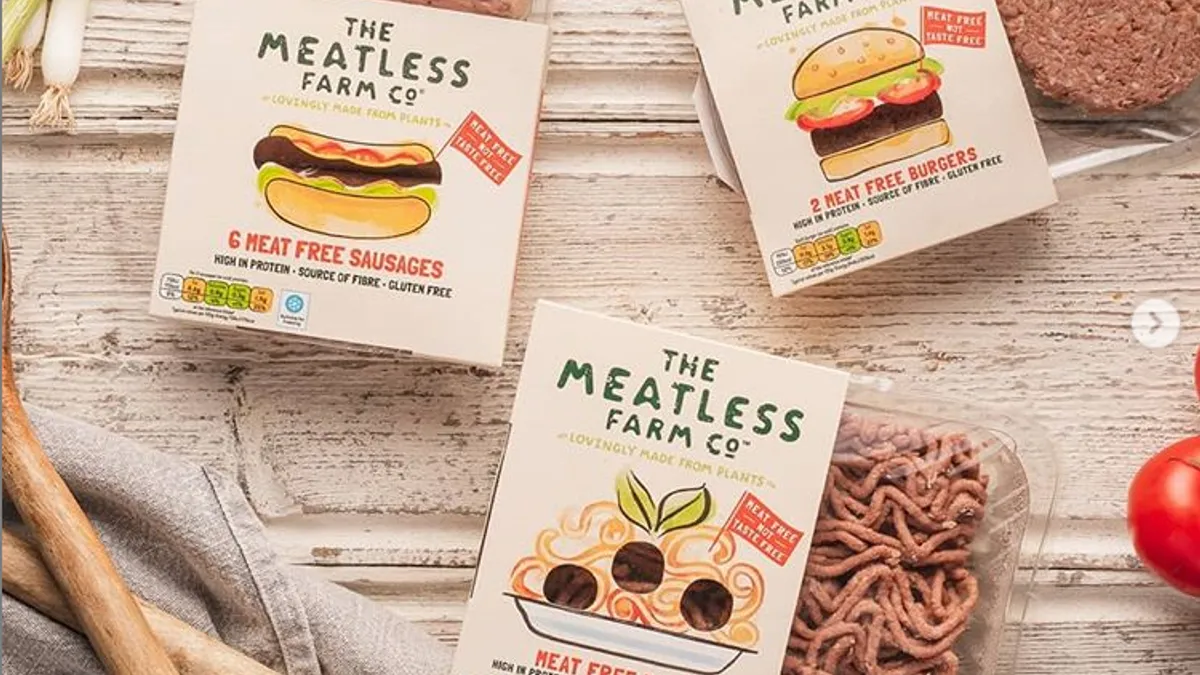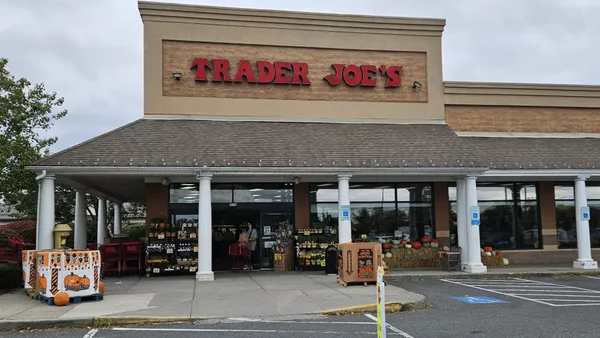Dive Brief:
- British plant-based meat manufacturer The Meatless Farm Co. signed a six-month exclusive distribution deal with Whole Foods to allow the company’s products to be distributed at U.S. stores starting this summer, CNN Business reported.
- Whole Foods will carry the company’s ground mince and burger patties in 480 Whole Foods stores nationwide and the U.K. manufacturer will set up an office in New York.
- The plant-based startup already sells ground beef, sausage and burgers in the U.K, Canada, Sweden, United Arab Emirates and Hong Kong.
Dive Insight:
Since the inception of the company, The Meatless Farm Co. has been searching to go global. Now, the company’s entrance into the U.S. marks its fifth international market, and perhaps its biggest one.
Plant-based meat has been taking off in all sectors of the food business. At the National Restaurant Association conference this year, Technomic Executive Vice President of Business Development Pat Noone said the number of plant-based food items on menus has grown 54% during the last five years. In order to provide for that influx, investors have put more than $16 billion into U.S. plant-based and cell-based meat companies in the past 10 years — $13 billion of it in 2017 and 2018.
The demand is there, but is the supply? Impossible Burger, one of the two first-movers in the space, is sold in 7,000 locations. It's expanding to Burger King with Impossible Whoppers, so that number could double by the end of the year. The company also plans to hit grocery store shelves this year as well. The only problem is that this massive increase in distribution has led to stock shortages. Similarly, Beyond Meat CEO Ethan Brown told Business Insider his company was in a similar jam in 2017 and 2018.
However, restaurants and grocery stores cannot substitute just any old veggie patty in and hope it will work. Consumers are looking for a lifelike replica of meat, and the veggie burgers of the 1990s will not suffice as an alternative anymore. Perhaps this is why Whole Foods chose to ink an exclusive deal with the Meatless Farm Co. By limiting the company's commitments, the supermarket chain can be better assured that the amount available won’t dip and shoppers won’t be left wondering where their favorite plant-based patty is. This will be especially important if the brand — which is gluten-free and made with soy and pea proteins — takes off.
What remains to be seen is whether this Whole Foods deal is exclusively for the physical supermarket. As a part of Amazon, there is a good chance that these patties will appear in ecommerce channels as well and, thanks to the brand's exclusivity, will be promoted at the top of the search lists.
At the same time that having such a large market opened practically guarantees growth for the company, there is a risk that like Beyond Meat and Impossible Burger, the British company will not be able to keep pace. While The Meatless Farm Co. is exclusive to Whole Foods stateside, the company is looking to expand into other international markets, which could stretch its resources too thinly if left unchecked.
If the company can develop a following though, it will want to hold on. The plant-based meat space is becoming crowded. According to an Innova Marketing Insights study reported by Food Ingredients First, within the first 9 months of 2018, 14% of global meat product launches were actually meat substitutes accounted — more than twice the amount 2013. That means that new startups are going to need either a competitive advantage or really good branding to make their way into the market.
The U.K. plant-based meat market is very different from that in the U.S. Many of Britain's main players are only in Europe, and the market doesn't seem to be nearly as crowded. European law also may closely regulate labeling of these products, with EU Parliament committees supporting bans on meat-related names for plant-based products. This ban may even extend to the long-used term "veggie burger," meaning the U.S. market is not only bigger, it feels more friendly.
Looking forward, it should be expected to see the proliferation of plant-based meat products plateau within the next few years. Going forward a few more years, it wouldn’t be shocking to see the mainstays become the big players and keep smaller companies elbowed out. As with all things food-related, taste will be the deciding factor, and it will be up to the consumer to decide which plant-based burgers survive.













